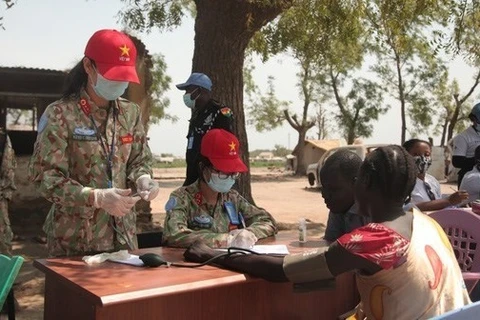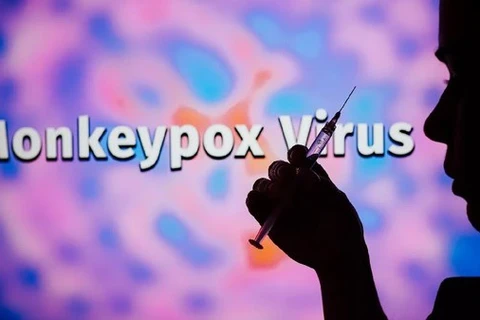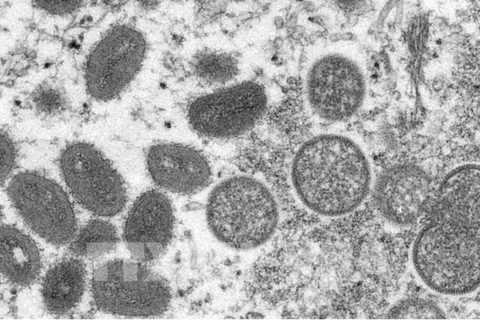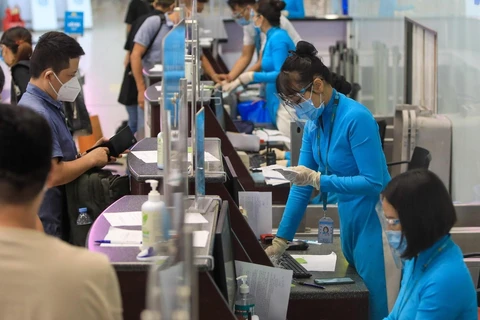 Deputy Health Minister Nguyen Thi Lien Huong chairs virtual meeting discussing ways in response to monkeypox (Photo: VNA)
Deputy Health Minister Nguyen Thi Lien Huong chairs virtual meeting discussing ways in response to monkeypox (Photo: VNA) Hanoi (VNA) - The Vietnamese health sector is focusing its capacity on strengthening surveillance and early detection of monkeypox cases at all border gates and provinces and cities, and building response scenarios, according to Deputy Health Minister Nguyen Thi Lien Huong.
The official told a July 24 virtual meeting discussing ways in response to the viral zoonosis that, to date, Vietnam has recorded no monkeypox cases, but the risk of transmission through border gates and those entering the country is large.
However, localities need to strengthen supervision over visitors from disease-hit countries, step up dissemination and provide residents with leaflets on the matter, she stressed, proposing medical facilities monitor and detect any case of rashes and burns in the community.
According to Huong, the health sector is currently waiting for support regarding biological test kits from the World Health Organisation (WHO). However, according to a report by the Pasteur Institute in Ho Chi Minh City, it is possible to use laboratory products to diagnose the disease in emergency cases.
Nguyen Vu Trung, Director of the Pasteur Institute in Ho Chi Minh City, expresses his wish that the WHO and US Centres for Disease Control and Prevention (CDC) assist Vietnam with chemicals and biological products to use in the early detection of suspected and confirmed monkeypox cases.
Do Hong Hien, an epidemiologist at WHO in Vietnam, said the disease's arrival in the country is just a matter of time. After that, there may be community transmission, and authorities need response measures to screen, prevent infections and protect the health of workers at high risk.
Hien recommended Vietnam prepare its capacity for diagnosis, isolation, and management so that when there is a case, it will contain the spread and minimise fatalities.
Japan is ready to supply Vietnam with certain biological products, which will be transferred to the National Institute of Hygiene and Epidemiology and the Pasteur Institute in Ho Chi Minh City as soon as possible.
Regarding the treatment, Nguyen Trong Khoa, Deputy Director of the Department of Medical Examination and Treatment, said that right after receiving information on monkeypox outbreaks worldwide, the department drafted guidelines for diagnosis and treatment. In the coming time, the Ministry of Health will conduct training on response to the disease for medical facilities.
Monkeypox is a zoonotic viral disease, meaning that it is transmitted from infected animals to humans.
The disease can spread to people when they come into physical contact with an infected animal. Monkeypox is commonly found in central and west Africa, where there are tropical rainforests and where animals that may carry the virus typically live.
Human-to-human transmission can occur via face-to-face exposure, direct physical contact, sexual contact, or contact with contaminated materials such as clothing or bedding.
The illness begins with many acute viral diseases, with fever (>38.5 degrees Celsius), headache, muscle aches, backache, swollen lymph nodes, and extreme fatigue. After 1 to 3 days, the patient develops rashes which often begins on the face, and then spreads to other parts of the body.
The rashes then develop into lesions which can be flat or slightly raised, filled with clear or yellowish fluid, and then crust, dry up and fall off. Symptoms typically last between 2 to 4 weeks and go away on their own without treatment.
On July 23, WHO Director-General Tedros Adhanom Ghebreyesus declared monkeypox a global public health emergency due to its rapid transmission rate and the risk of its spread further to other countries.
The world has recorded nearly 16,000 cases in 74 countries with five deaths, and an increase in cases, especially in some European nations, has been posted./.























